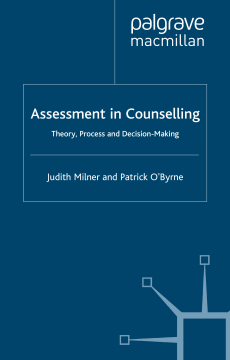
Additional Information
Book Details
Abstract
Whilst assessment has long been central to the counselling process, with the recent moves towards evidence-based practice and increased regulation it is taking an increasingly pivotal role in service provision. This important new text helps clarify the nature and purpose of assessment in counselling. It explores the theoretical underpinnings of assessment across the core therapeutic schools and addresses critical differences in the meanings and importance deferred to it. It will be invaluable reading for all trainees as well as for practitioners wishing to gain a broad insight into therapeutic practice across the boundaries of the many therapeutic models.
'Suitable for experienced and new counsellors, this would be a worthy addition to training course reading lists.' - Angela Cooper, Counselling and Psychotherapy Journal
JUDITH MILNER and PATRICK O'BYRNE are both freelance brief therapists with the Northope Hall Trust Counselling Scheme for young people who have experienced violence, school children with emotional and behavioural problems, adults with mental health problems and substance abuse. They also work with the Kirklees Domestic Violence/Northope Hall Trust domestic violence scheme which provides counselling for men and women who are violent to their partners. Judith also provides training in solution focussed and narrative therapies for a wide range of professionals. Patrick is also a family mediator with the West Yorkshire Family Mediation Service.
Table of Contents
| Section Title | Page | Action | Price |
|---|---|---|---|
| Contents | v | ||
| List of Tables and Figures | ix | ||
| Preface | x | ||
| Acknowledgements | xiii | ||
| 1. Introduction: Assessment Complexities | 1 | ||
| 2. The Climate of Counselling | 19 | ||
| 3. Assessment: What, When and How? | 42 | ||
| 4. Psychodynamic Approaches: A Map of the Ocean | 62 | ||
| 5. Transactional Analysis: A ‘Games’ Map | 83 | ||
| 6. Cognitive Approaches: Handy Road Maps | 103 | ||
| 7. The Person-Centred Approach: A Growth Map | 120 | ||
| 8. The Narrative Approach: A Forecast Map | 135 | ||
| 9. The Solution-Focused Approach: A Navigator’s Map | 154 | ||
| 10. Integrative Models. Mixed Metaphors | 172 | ||
| 11. Assessment Decisions | 191 | ||
| Concluding Remarks | 207 | ||
| References | 208 | ||
| Index | 226 |
